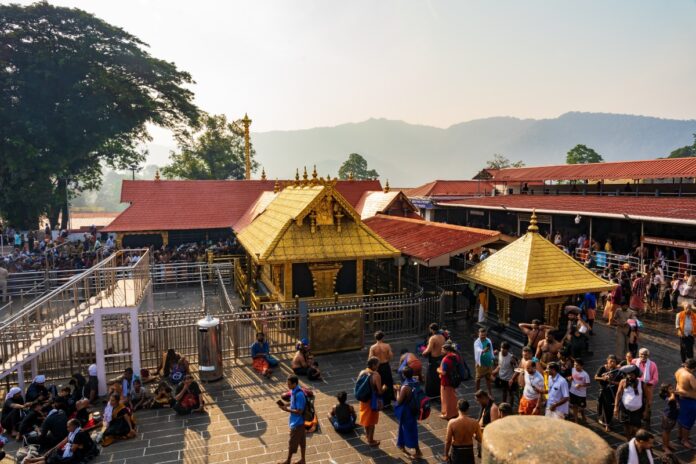Sabarimala Makara Jyothi Live 2025
Sabarimala, located atop the Sahyadri mountain range, is more than just a temple; it is a spiritual journey that devotees undertake with unwavering faith. The presiding deity, Lord Ayyappa, is believed to be a symbol of unity, transcending the boundaries of caste, creed, and religion. Devotees embark on a challenging trek through dense forests and steep hills to reach the sanctum sanctorum, known as the Sannidhanam, where the divine aura of Lord Ayyappa is said to reside.
Also Read: Sabarimala Temple: History, Timings, Location
Sabarimala Makara Jyothi History
- Makara Jyothi Star:
-
-
- Appears in the sky on Makar Sankranti.
- Marks Sun’s transit from Dhanu rashi to Makara rashi.
- January 15 is the first day of the Malayalam month of Makaram.
-
- Sabarimala Pilgrimage:
-
-
- Culminates with the sighting of Makara Jyothi.
- Marks the Sun’s transition.
-
- Lord Ayyappa’s Sacred Ornaments:
-
-
- Procession from Pandalam palace to Sabarimala shrine (80 km).
- Pandalam royal family is the custodian.
- Ornaments brought on the evening of Makar Sankranti.
-
- Makara Vilakku:
-
-
- Lit on Ponnambalamedu plateau across Sabarimala temple.
- Believed to have celestial origins.
- The chief priest of Pamba temple shows the light to devotees three times.
-
- Historical Ritual Performers:
-
-
- Malaya araya tribals performed the ritual in the past.
- Lost the right after Travancore Devaswom Board took over temple’s administration in the early 1950s.
-
- Makaravilakku Festival:
-
- Lasts seven days.
- Pilgrims often stay back until the festival concludes.
- Kuruthi pooja is performed.
Makara Jyothi Significance
The Makara Jyothi is not merely a celestial phenomenon; it is steeped in spiritual significance. According to Hindu mythology, Lord Ayyappa, an incarnation of Lord Vishnu, attained enlightenment on the day of Makara Sankranti. Devotees believe that the divine light symbolizes Lord Ayyappa’s presence and blessings, illuminating their path toward spiritual awakening and salvation.
Sabarimala Piligrimage – Makar Jyothi 2025
- The pilgrimage to Sabarimala is not for the faint-hearted. Devotees undergo a strict 41-day penance, known as the “Mandala Vratham,” which involves abstaining from worldly pleasures, practicing celibacy, and adhering to a disciplined lifestyle.
- The pilgrimage reaches its end on the day of Makara Jyothi when millions of devotees converge at the Sannidhanam to witness the divine light.
- The entire pilgrimage is a unique blend of tradition, devotion, and discipline. Pilgrims wear black attire, symbolizing renunciation, and carry the traditional “Irumudi Kettu” – a two-compartment bag containing offerings for Lord Ayyappa.
- The journey involves climbing the 18 sacred steps, each representing a facet of self-discipline and spiritual growth.
Makara Jyothi 2025 Date
- The Makara Jyothi appears annually on the day of Makar Sankranthi. In 2025, on January 14th, it holds a special place in the hearts of Sabarimala devotees.
- On the evening of Makara Sankranti, millions of devotees gather on the hills of Sabarimala, eagerly awaiting the divine spectacle. The atmosphere is charged with palpable devotion and spiritual fervor.
- Also known as the “Makaravilakku,” this celestial event occurs as the sun sets over the Ponnambalamedu hills, casting a divine light visible from the Sabarimala temple premises.
- “Makara” refers to the zodiac sign Capricorn, while “Jyothi” means light. Devotees believe that witnessing the Makara Jyothi is a promising and transformative experience.
Sabarimala Makara Jyothi Truth
- Divine Phenomenon or Man-Made Tradition: The truth behind Sabarimala Makara Jyothi secret has been a subject of debate. While believers consider it a divine phenomenon, skeptics argue that it might be a man-made tradition perpetuated for cultural and economic reasons. The contradiction between faith and skepticism adds an intriguing layer to the spiritual narrative.
- Scientific Explanations: Some scientific explanations propose that the Makara Jyothi phenomenon could be attributed to the alignment of stars and the natural occurrence of a bright celestial object on the horizon. However, these explanations do not diminish the spiritual significance attributed to the event by devout followers.
- Cultural and Economic Impact: Regardless of the debates surrounding its origin, Makara Jyothi has undeniably become an integral part of the cultural and economic fabric of Kerala. The pilgrimage season boosts tourism, and the event’s cultural significance contributes to the identity of the region.
Conclusion
The Sabarimala Makara Jyothi festival is not just a celebration; it is an embodiment of unwavering faith, discipline, and spiritual transformation. The celestial light that graces the Ponnambalamedu hills during this festival serves as a beacon, guiding devotees on their path to self-realization and enlightenment. Sabarimala, with its unique traditions and the mesmerizing Makara Jyothi, continues to be a sacred haven for millions who seek solace, unity, and divine blessings.





